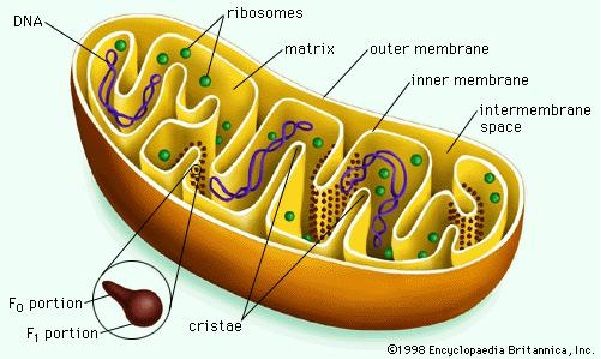Potential health benefits of smoking tobacco - Part Three
Smoking and Mitochondrial function
To understand how smoking tobacco may affect mitochondrial function, first it is imperative to have a basic understanding of how the mitochondria work and what their function is.

Structures called mitochondria are located within the cell and are known as the “powerhouse” responsible for generating energy to supply the body’s metabolic requirements. The mitochondria’s function is to take electrons + protons from the environment (FOOD) and use them to synthesise what is known as Adenosine Triphosphate (ATP), the body’s supposed ‘energy currency’ (Gilbert Ling might disagree with this). Through a process called cellular respiration, electrons taken from digested food are shuttled past the mitochondrial membrane with help from specific molecules (via electron chain transport) so that the mitochondria can create ATP. The common theory of ATP is that it is used to fuel the majority of processes in the body. What is accepted is that ATP is absolutely essential for human life to exist. Recent work by researchers such as Dr Doug Wallace and others in the field indicates that mitochondrial dysfunction may be at the route of most modern-day diseases. This means that maintaining healthy mitochondrial function is of vital importance.
One of the key players involved in ATP production is the redox molecule Nicotinamide adenine dinucleotide (NAD). NAD is present in all living cells and is available in two states: NADH and NAD+. Both forms are essential for proper cellular energy transfer. NADH’s function is to carry electrons in the mitochondria to facilitate ATP synthesis. Once NADH has donated those electrons, it becomes NAD+. NAD+ has been shown(45) to increase the rate of DNA repair, stress resistance, and regulate cell apoptosis. Furthermore, NAD+ also restores tissue integrity, induces homoeostasis, and increases longevity of the cell(46). The cell senses levels of NAD+ as a measure of mitochondrial energy production and rate of metabolism. For this reason, the amount of NAD+ converted actually plays a significant role in regulating the rate of ATP synthesis and cellular metabolism(47). In other words, high NAD+ = fast rate of ATP synthesis, whereas low NAD+/high NADH = slower ATP synthesis + lots of other bad stuff (less mitochondiral biogenesis(48) and more ageing (49)). Interestingly, NAD+ also has the ability to alter gene expression by “switching off” genes associated with degenerative processes(50).
To follow on, SIRT1 (sirtuin) is a NAD-dependent protein coded for by the SIRT1 gene that relies on high levels of NAD+. So when NAD+ levels decrease, SIRT1 levels also decrease theoretically, and vice versa. SIRT1 turns out to be an important enzyme in the control of epigenetic expression, metabolism and longevity. Studies have shown that SIRT1 inhibits MTOR pathway signalling, increases leptin sensitivity(51), increases T3 hormone sensitivity(52), and also increases the skin’ sensitivity to Vitamin D(53). SIRT1 also inhibits/ switches off genes associated with inflammation(54), blood sugar regulation, and body fat accumulation/storage(55).
So, how does this relate to smoking tobacco?
One study(56) conducted by Cancer Research in 2012 showed:
SIRT1 activity was the most consistently and significantly up-regulated in smokers compared to non-smokers in all 4 datasets. While SIRT1 was activity correlated to smoking status, SIRT1 pathway activation was not significantly correlated with pack-years among smokers (p > 0.05; Spearman). Therefore, independent of cumulative exposure, SIRT1 activity is consistently up-regulated in smokers. This increase in SIRT1 activity may serve as a protective effect against oxidative stress and DNA damage induced by smoking.
Smokers had higher SIRT1 ------> SIRT1 is NAD+ dependent = Smokers likely had higher levels of NAD+ in relation to NADH. An elevated level of NAD+ suggests more efficient mitochondrial function.
So... if smoking help mitochondria for SOME people, it would help explain the previous finding. It also provides valuable insight in to how many smokers end up leading long and disease-free lives. For some people (who may possibly be genetically compatible), consuming tobacco does not seem to be a burden on the body. Perhaps these people do not live so long despite their smoking habits, but actually live so long BECAUSE they smoke. Below are some real-life examples of this.
Big Shocker: Most “Supercentenarians” were/are smokers
French supercentenarian Jeanne Louise Calment was born on February 21st 1875, and on the 4th of August 1997, she was confirmed to have died from natural causes. She lived for a total of 122 years(57). Her secret? Calment smoked from the age of 21 up until the ripe old age of 117 when she finally decided to give up the habit.
Jose Aguinelo dos Santos, a Brazilian man whose parents were African slaves, was born on July 7th 1888. In July 2014, Jose reached his 126th birthday(58). Interestingly, Jose has smoked a pack of cigarettes every single day for the past 50 years.
Britain’s ‘oldest smoker’, Winnie Langley was born in Croydon in 1907. At her 100th birthday party, Winnie said: “I have smoked ever since infant school and I have never thought about quitting”. It is thought that she smoked more that 170,000 cigarettes throughout her life59. Sadly, two years later Winnie’s life was cut short at the young age of 102.
Born on Auguest 21st 1891 in Puerto Rico, Emiliano smoked for a whole 76 years before giving up at the age of 90. In 2007, Emiliano passed away at age 115 from natural causes(60).
Sek Yi was a devout buddhist and a martial arts expert who was believed to have been born in 1881. In October 2003, Sek passed away at the age of 122 years old. Sek attibuted his longevity and that of his 108 year old wife to smoking and prayer. In an interview, Sek said: “When I was young I used to chew betel, but people made fun of me saying I was like a woman, so I took up smoking.”(61)
Batuli Lamichhan was born in Nepal in March 1903, which now makes her 112 years old. She is still alive, and has been smoking 30 cigarrettes a day for the past 95 years ever since she was 17. Apparently, Batuli “claims it’s her daily habit that has helped her outlive almost everyone else in her village – and her own children”62.

Christian Mortensen
Finally, danish-american supercentenarian Christian Mortensen was born on August 16th 1882. Christian passed away on April 25th 1998 at the age of 115 years old. When asked what his secret to a long life was, he said: “Friends, a good cigar, drinking lots of good water, no alcohol, staying positive and lots of singing will keep you alive for a long time.”63.
Conclusion
From the above evidence that I have cited, it seems fair to conclude that in some cases smoking tobacco has the ability to:
-protect the lungs against a variety of disease-states
-increase the body’s ability to detoxify
-increase cognitive capacity
-turn OFF genes that are pro-inflammatory and to turn ON genes that are anti-inflammatory
-indirectly increase longevity via enhancing mitochondrial function
I believe that some of this research may have staggering implications for the health of many smokers. It also brings to mind the possible effect of smokers constantly being told by health authorities that “smoking causes cancer”
Our state of mind, our beliefs, and our thoughts can all influence epigenetic expression. It has been consistently shown that changing one’s beliefs about oneself and the outside world can have profound effects on the state of a person’s physiology. In other words, your state of mind can allow the body to overcome disease-states. On the flip side, believing that you will get cancer can also outwardly manifest as cancer in the body. So, it makes me wonder how many instances of cancer amongst smokers are actually due to people internalising the messages they are subject to via the media which then essentially manifest in their biology. We can’t really be certain about anything at this point, but one thing is for sure: more unbiased research needs to be done in this area.
The idea that smoking is an unhealthy practice is a relatively recent one which has come and gone throughout modern history. There have actually been numerous attempts by anti-smokers to enforce legislation set out to ban smoking – but fortunately, tobacco bans have always been unsuccessful in the long run. What many people fail to grok is that smoking was known as a healing practice by the indigenous native American populations for thousands of years, and was also acknowledged by those who first imported tobacco into Europe as medicine. It was used to treat conditions such as asthma, psoriasis, and fever.
Nowadays, wide-spread discrimination against smokers appears to be more common than ever. Smokers are generally made to feel guilty for their personal choice to smoke by their non-smoking peers. Fortunately for anyone reading this article and educating themselves on the truth about tobacco, they can feel confident that lighting up is probably not going to completely destroy their health.
References available here: https://www.sott.net/article/338885-A-comprehensive-review-of-the-many-health-benefits-of-smoking-Tobacco
Congratulations @eonutrition! You received a personal award!
Click here to view your Board
Congratulations @eonutrition! You received a personal award!
You can view your badges on your Steem Board and compare to others on the Steem Ranking
Vote for @Steemitboard as a witness to get one more award and increased upvotes!